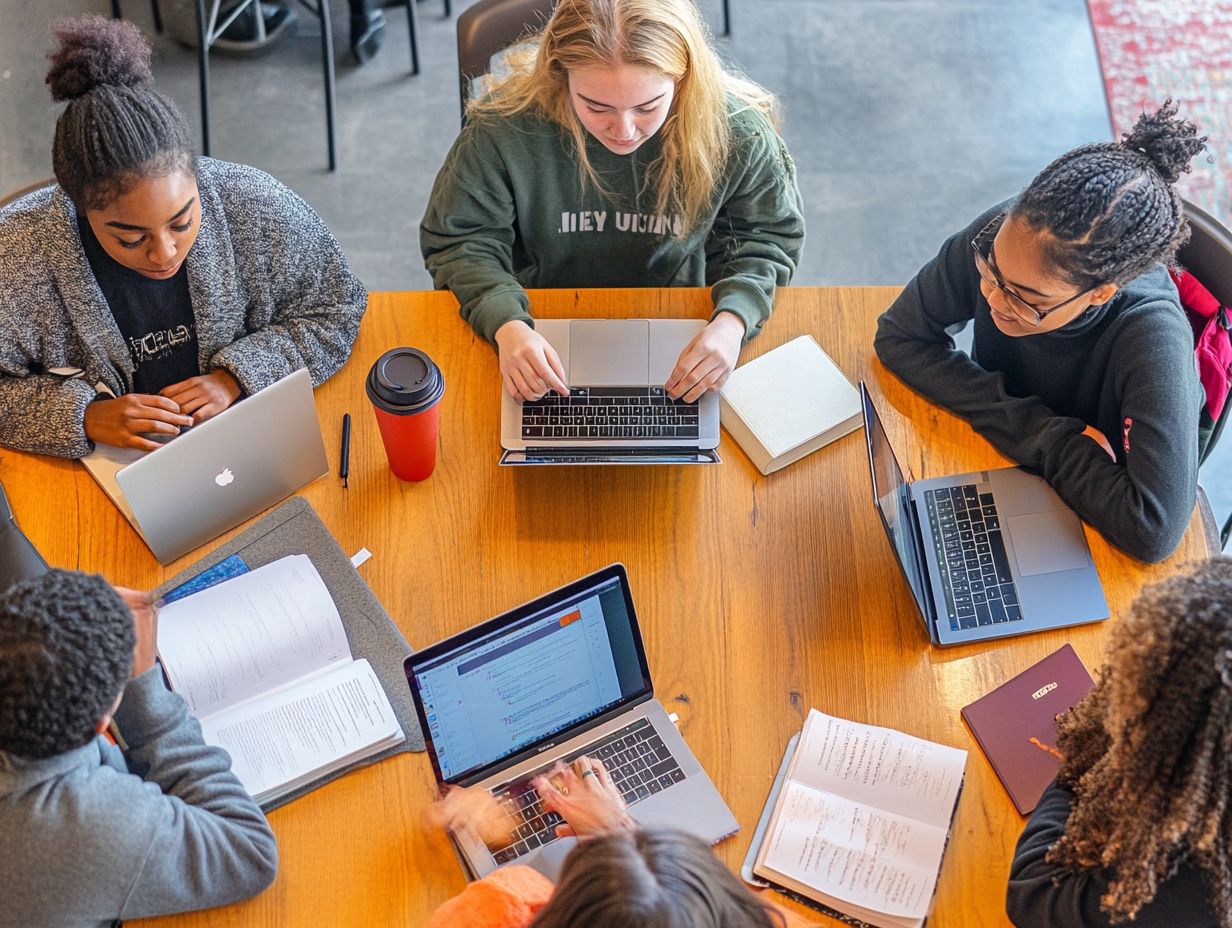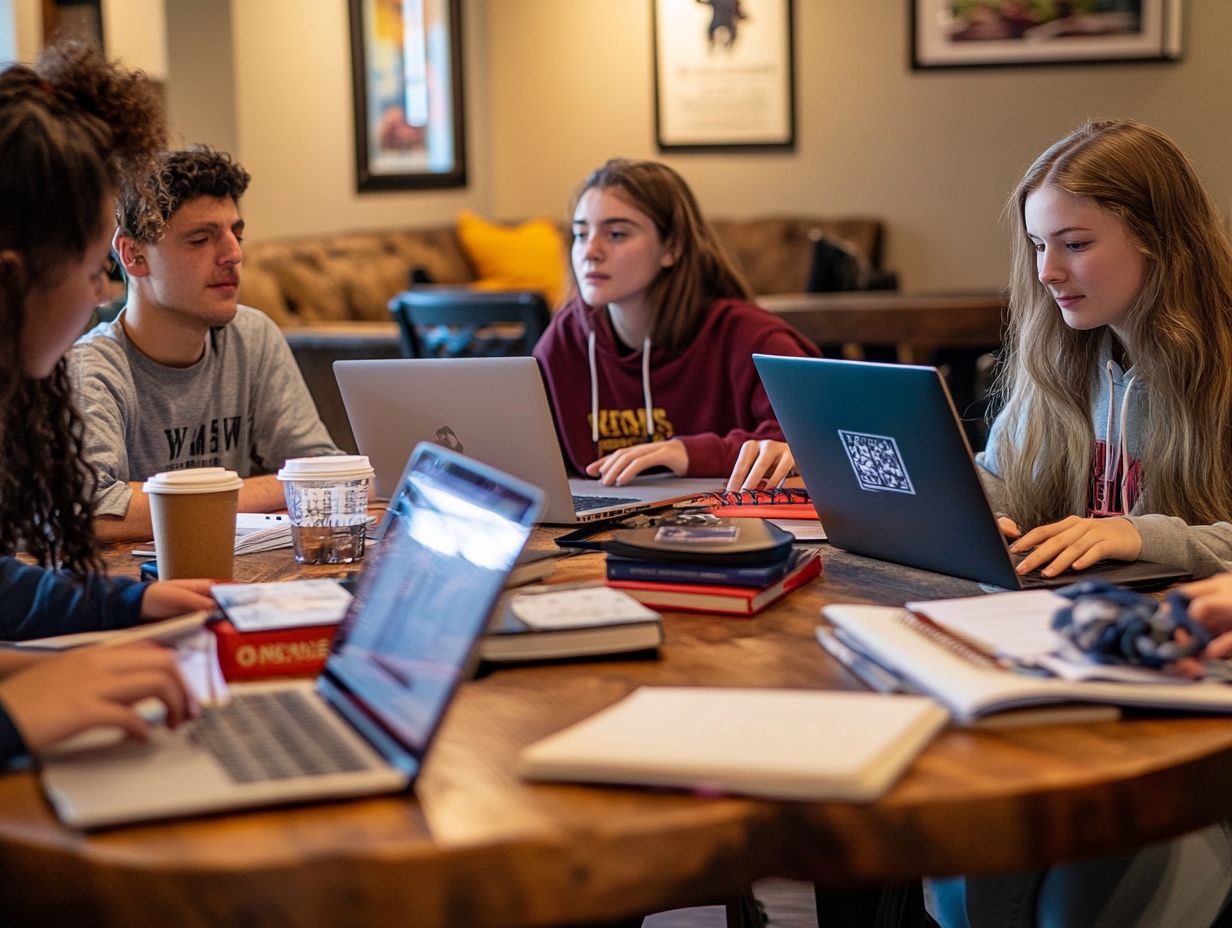How to Connect with Other Online Associate Degree Students
Online learning has changed education. It s more accessible than ever.
Establishing connections with fellow online associate degree students is essential. It enriches your educational experience.
This article explains why networking matters. It also provides practical ways to connect through forums, study groups, and social media.
It addresses common challenges you might face, like time zone differences and technical issues.
Get ready to discover tips that will help you build strong relationships that significantly enhance your academic journey.
Contents
- Key Takeaways:
- Why Connect with Other Students?
- Ways to Connect with Other Online Associate Degree Students
- Challenges and Solutions for Connecting Online
- Tips for Building Strong Connections
- Frequently Asked Questions
- Q1: How can I connect with other online associate degree students?
- Q2: Why is it important to connect with other online associate degree students?
- Q3: Is it possible to connect with other online associate degree students from different schools?
- Q4: Can I connect with other online associate degree students in my area?
- Q5: What are some tips for connecting with other online associate degree students?
- Q6: Can connecting with other online associate degree students help me with my career?
Key Takeaways:

Building connections with other online associate degree students is important for academic success and personal growth.
Utilize online forums, discussion boards, virtual study groups, and social media groups to connect with other students and explore the best tools for online associate degree students.
Communication, collaboration, participation, and engagement are key strategies for building strong connections in the online learning environment.
Overview of Online Learning and its Benefits
Online learning has transformed the educational landscape, especially for those pursuing an associate degree through online community colleges.
As you juggle work, family, and academic responsibilities, the flexibility of remote learning gives you the power to customize your education around your unique schedule.
With top-ranked universities offering accredited online programs, you can access high-quality instruction from the comfort of your home. Education is now more affordable and accessible than ever.
This format brings distinct advantages, particularly the choice between classes you can take on your own time or at set times.
Real-time classes let you interact with instructors and peers, while classes that let you learn at your own pace provide freedom to engage with materials as you choose.
Studies show that 70% of online learners appreciate this flexibility, leading to improved engagement and retention rates.
Strong academic support systems help you succeed. Reports indicate that institutions implementing these resources experience a 15% increase in completion rates, highlighting the effectiveness of online education in fostering positive student outcomes.
Why Connect with Other Students?
Connecting with fellow students is essential. It helps you feel at home and enriches your college experience.
As you transition to remote learning, it s easy to feel isolated. This can take a toll on both your mental health and academic performance.
By actively engaging with your peers through student organizations, academic advising, and social media groups, you can build meaningful connections.
These connections not only support your educational goals but also contribute significantly to your success.
Importance of Building Connections
Building connections among students in an online community college environment enhances your outcomes. It promotes collaborative learning and academic support, and understanding how to network while earning your online bachelor’s degree can further enrich this experience.
When you establish community connections, you open the door to sharing resources, study habits, and insights. This creates familiarity with your peers and alleviates the isolation often felt in remote education.
This interconnectedness helps you excel academically and nurtures your emotional well-being, resulting in a more holistic educational experience.
For instance, consider a group of students who formed a virtual study circle. They exchanged notes and tackled challenging assignments together.
This collaboration led to improved grades for everyone involved. They clarified doubts in real-time and provided diverse perspectives on complex topics.
You ll often find that feeling less anxious and more motivated becomes second nature when you have a support network to rely on.
By leveraging these relationships, you’re better equipped to navigate the challenges of your academic journey. Transform your overall college experience into something truly enriching.
Ways to Connect with Other Online Associate Degree Students
You can cultivate connections with fellow online associate degree students through various engaging methods that are crucial for getting academic support in online associate programs and building a supportive academic community.
Online forums and discussion boards allow you to share ideas and collaborate on projects. This fosters a sense of camaraderie. Meanwhile, virtual study groups create a structured environment for collective learning, where you can thrive together.
Don t overlook the power of social media groups. These offer informal platforms for interaction and enrich your overall learning experience.
Online Forums and Discussion Boards

Online forums and discussion boards are essential tools that foster communication and collaboration among students in an online community college environment. These platforms give the power for you to engage in meaningful discussions, share course materials, and seek academic support from your peers, significantly enhancing your overall learning experience.
Platforms like Reddit’s educational subreddits, Discord study groups, and specialized forums such as GradCafe or College Confidential offer you spaces to connect. Here, you can delve into course concepts and exchange ideas on assignments.
You can even collaborate on projects. Forums facilitate peer learning and encourage networking, which can be incredibly valuable for your academic and career growth.
To truly maximize the benefits, it s important for you to actively participate by asking questions, respecting diverse opinions, and utilizing resources like pinned threads or FAQ sections for more structured guidance.
Virtual Study Groups
Virtual study groups provide a great way for online community college students to collaborate on coursework and exchange knowledge. They also help maintain accountability in your academic journey.
By establishing a regular meeting schedule, you can engage deeply with course materials. This enhances your understanding through peer discussions and working together to solve problems.
These collaborative spaces pave the way for academic success and strengthen the bonds within your community. As you share diverse perspectives and resources, you can inspire one another to stay focused and tackle challenges together, fostering a supportive learning environment.
To create effective study groups, it s crucial to:
- Define clear objectives
- Select convenient platforms for communication
- Establish ground rules for participation and respect
Testimonials from fellow students often highlight moments of breakthrough learning or newfound confidence that emerged from brainstorming sessions. This showcases the transformative power of these virtual interactions.
Social Media Groups
Social media groups are rapidly becoming an essential platform for online community college students to connect, exchange resources, and cultivate academic support. Through these channels, you can engage with peers, dive into discussions, and collaborate on projects to enhance your educational journey.
These digital spaces make communication easy and give you quick access to valuable resources, mentorship opportunities (guidance from experienced individuals), and networking possibilities. Platforms like Facebook, Instagram, and Discord have emerged as essential tools where current and prospective students can create organizations centered around shared interests.
You can share study materials and promote events designed for academic success. Successful student-led groups, especially those focused on STEM or the arts, have harnessed these platforms to organize virtual study sessions and workshops, fostering a collaborative culture that enriches the online learning experience.
By nurturing these communities online, you can build relationships that pave the way for academic advancement and professional networking opportunities in your fields of interest.
Challenges and Solutions for Connecting Online
Connecting with fellow students in online community colleges is vital for your academic success, as highlighted in the importance of networking in online associate programs. Yet, several challenges can hinder these interactions.
Time zone differences and technical issues can make it hard to connect with others. As you navigate the landscape of remote learning, the disparities in schedules can foster feelings of isolation, ultimately impacting your mental health and overall engagement within the community.
Start engaging today and unlock the full potential of your online learning experience!
Overcoming Time Zone Differences
Overcoming time zone differences is crucial for fostering engagement among students in online community colleges. Diverse geographical locations can create barriers to collaboration and communication.
By embracing flexible scheduling and learning that doesn’t happen at the same time for everyone, you can effectively connect with your peers and maintain your academic support systems. This approach allows you to participate at your convenience and promotes greater inclusivity.
With individuals from various regions sharing insights and knowledge, you can dive into exciting discussions without the constraints of synchronized hours.
Utilizing tools like Doodle or Google Calendar simplifies scheduling virtual meetings, helping you find a time that works for everyone involved.
Successful examples of virtual study groups that navigate time zone challenges showcase how teamwork can truly thrive in such environments. These interactions significantly enrich your learning experience.
By leveraging these strategies, you can transform potential obstacles into opportunities for collaboration and growth.
Dealing with Technical Difficulties

Technical difficulties are a common hurdle you ll face as a student in an online community college, impacting your ability to dive deep into courses and access essential academic resources. By understanding potential issues ahead of time and proactively seeking solutions, you can minimize disruptions and enhance your educational journey.
You must get familiar with the support resources available to you on your specific online platform. These typically include FAQs, forums, and live chat options that can help you tackle common concerns quickly and effectively.
A reliable internet connection is essential; connectivity issues can lead to frustration and derail your learning experience. Make it a habit to check in with your ISP regularly, invest in quality routers, and reach out to support if you’re experiencing slow-speed problems.
Keeping your devices updated and troubleshooting basic issues like clearing your cache can make a world of difference. Emphasizing technology proficiency not only helps you maintain momentum in your studies but also creates a more engaging and productive online learning environment.
Tips for Building Strong Connections
Building strong connections with fellow students in an online community college setting demands intentional efforts and effective communication strategies. By actively participating in discussions, joining student organizations, and engaging with your peers, you can forge meaningful relationships that enrich your academic experience. Understanding what to expect from online associate degree classes can further support your educational goals.
Communication and Collaboration Strategies
Effective communication and collaboration strategies are crucial for you as a student in an online community college. They allow you to build strong connections and foster the academic support you need.
By leveraging various tools and platforms, you can enhance your engagement and create collaborative learning environments that benefit everyone involved. Among the most impactful tools are video conferencing platforms like Zoom or Microsoft Teams. These platforms enable you to hold real-time discussions, engage in presentations, and share insights visually.
Messaging apps like Slack or Discord facilitate quick communication, allowing you to ask questions or share resources instantly.
Collaborative documents offered by Google Docs or Microsoft OneDrive make it easy for you and your peers to work together on assignments, allowing for simultaneous editing and commenting.
In virtual study groups, these tools not only streamline brainstorming and knowledge sharing but also help cultivate a sense of camaraderie and accountability, mimicking the interactions typically found in a traditional classroom.
Participation and Engagement Techniques
Engagement techniques are crucial for staying connected in your online community college experience. Embrace various strategies to enhance academic support and build a nurturing environment.
Setting clear goals is vital; when you know precisely what you’re aiming for, you’re much more likely to dive in wholeheartedly.
Utilizing discussion prompts can ignite meaningful conversations, encouraging you to share your unique perspectives and experiences.
Establishing ways to keep you accountable, like meetings with classmates to discuss your progress or group projects, can keep you motivated and committed to your coursework.
Student organizations are instrumental in fostering engagement, offering excellent opportunities for collaboration and networking.
For instance, clubs centered around specific interests often host events that draw participation and build camaraderie among members. This creates a vibrant academic atmosphere where you can truly thrive.
Frequently Asked Questions
Q1: How can I connect with other online associate degree students?

Join online discussion forums, social media groups, or virtual study sessions to connect with others. For tips on maintaining your drive, check out how to stay motivated during your online associate degree and attend online events your school organizes.
Q2: Why is it important to connect with other online associate degree students?
Connecting with peers offers community and support, helping build relationships that benefit your academic and professional growth.
Q3: Is it possible to connect with other online associate degree students from different schools?
Yes! You can connect with students from other schools through shared programs or similar interests.
Q4: Can I connect with other online associate degree students in my area?
Absolutely! Many online programs include students from your area. To enhance your experience, consider exploring understanding online learning platforms for associate degrees and use social media to find and connect with local classmates.
Q5: What are some tips for connecting with other online associate degree students?
To connect, join online groups, engage in events, and be open to new friendships. Always be respectful and professional while interacting with classmates! It makes a big difference!
Q6: Can connecting with other online associate degree students help me with my career?
Yes, networking with peers can open doors to job opportunities and mentorship that guide your career.






